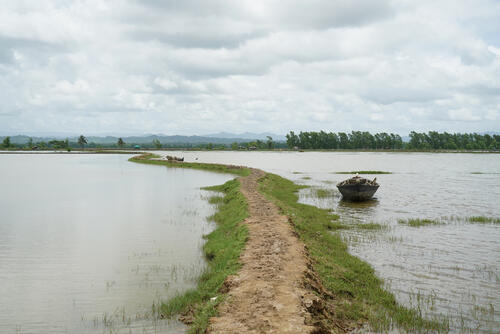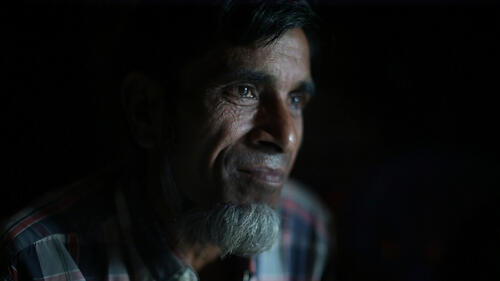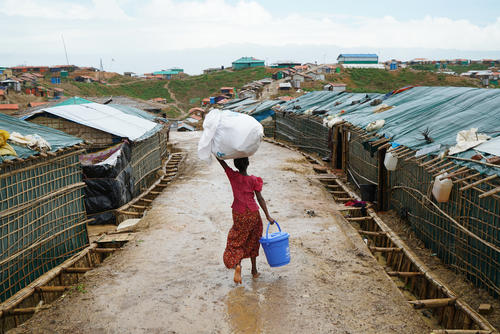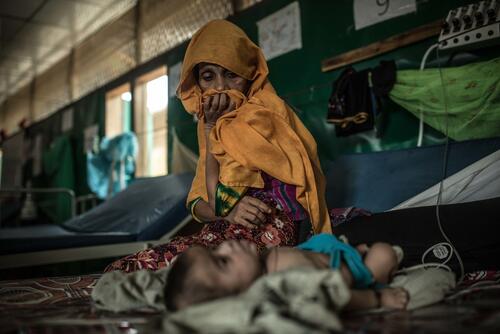Mah and his family left Myanmar in 2013, after violence and persecution forced them to flee. He is an active member of the Rohingya community in Malaysia.
Here, Mah recounts his experience in Myanmar and the challenges he and his family are facing in Malaysia.
Life in Myanmar
I was born in Maungdaw, northern Rakhine. I worked for a few different non-governmental organisations until things became too difficult for me to stay in Myanmar. The government would encourage violence between the local Rakhine population and the Rohingya community in Maungdaw.
In 2012, the situation really deteriorated. The Burmese [Myanmar] media used derogatory words to describe the Rohingya, and referred to us as “illegal Bengalis”. A group of Rohingya men were shot coming out of the mosque, the Rakhine community started setting fire to our homes. Many Rohingya fled; others were arrested arbitrarily.
At night, I saw the Myanmar security forces dumping the bodies of people they’d killed into mass graves. I saw 40 or 50 bodies being thrown in. Our movements were restricted, a curfew was imposed and we had to stay at home. But home wasn’t safe either – soldiers could just come into your house and kill you at random.
Gatherings of more than five people were outlawed, which meant we couldn’t go to mosque, school or work. I was too afraid to sleep at home, so for months I slept with two colleagues at our office.
Then, in early 2013, my name appeared on a ‘wanted list’. I was afraid of being arrested and, as it was getting harder to move around, I decided to leave Myanmar.
Life in Malaysia
I arrived in Malaysia in June 2013 and, compared with many other Rohingya refugees, I was able to apply for refugee status relatively easily. My wife joined a few months later with our three children. Whereas it only took me a few months to get my UNHCR refugee card, the rest of my family had to wait for a year to get theirs.
Life in Malaysia is not without its challenges. During their first year here, my children missed out on school. They can’t attend public school, so they have to go to informal schools where they don’t get any qualifications. My daughter, who is 13, cannot sit government examinations and I can’t afford to send her to a private school. I worry about my children’s future.
I am also not legally allowed to work. Not having any legal status makes everyday life very stressful. We are always under the threat of being arrested, sent to an immigration detention centre or blackmailed. I’ve been stopped four times, and it is only down to luck that I’ve never been detained. Other Rohingya I know haven’t been so lucky; some have spent months or years in detention.
One of the biggest difficulties here is accessing healthcare. Once, when I had a bad fever, I tried to visit a government hospital but was refused treatment. I had to find a private hospital and pay a lot of money. Although I have the UNHCR card now, healthcare is still expensive. But at least we get some help paying for it. Before I had the card, it was impossible to pay for treatment.
My wife and I had a child in Malaysia who was born with complications. We had to wait four months for an MRI scan. Recently our baby had to have eye surgery. The government hospital didn’t think it was an emergency case, even though our baby was at risk of losing sight in one eye. We were referred to a private hospital, which isn’t covered by the UNHCR insurance and cost a lot of money. The doctors there didn’t provide us with much information about the treatment options. They just did what they wanted with our baby and then gave us the bill.
Now that my wife is pregnant again we will go to a private clinic for treatment. I don’t want my family to stay in Malaysia. I’d like us to be resettled one day, particularly since our baby is unwell.
In August 2017, when the latest violence against the Rohingya started in Rakhine, seven people from my village were killed and around 50 people were arrested. The pattern of violence was not so different to previous ones – Rohingya people were targeted indiscriminately, their homes set alight, and people ran for their lives.
My family fled to Bangladesh after our village was set on fire. There is no one left there now – the village is empty. The camp in Bangladesh where my mother and brother live has no medical facilities – people have to travel 40 minutes just to reach a facility. It’s difficult, but at least they are safe in Bangladesh.






